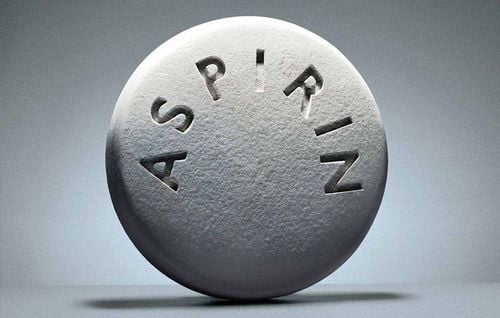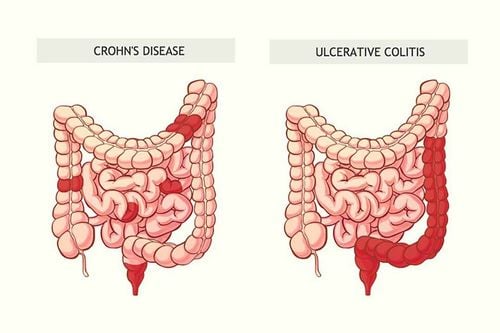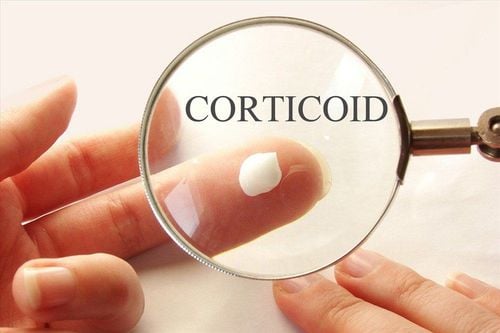This is an automatically translated article.
Ulcerative colitis is no less common than peptic ulcer disease in our country. Although both are diseases of the gastrointestinal tract, the drugs for ulcerative colitis are fundamentally not the same as those for peptic ulcers and are almost as well known less than drugs for peptic ulcers. The following article will present about the drugs used in the treatment regimen for ulcerative colitis, invite you to learn.
1. What is ulcerative colitis?
Ulcerative colitis is a disease that mainly affects the large intestine, it can be caused by an abnormal response from the body's immune system. Some symptoms of ulcerative colitis:
Abdominal pain, discomfort, colon spasms. Persistent diarrhea. There is blood in the stools.
2. Drugs to treat ulcerative colitis
2.1 Anti-inflammatory 2.1.1. Aminosalicylate group of drugs This group of drugs has anti-inflammatory properties of the gastrointestinal tract, is a medicine for mild to moderate ulcerative colitis. However, according to experts, it is possible that this group of drugs can limit the biosynthesis of prostaglandins (the mediators in inflammatory reactions) thereby reducing inflammation in the digestive tract. Depending on the area of the colon with ulcerative colitis, your doctor may prescribe you different forms of medicine such as tablets, suppositories, etc. It also has the ability to prevent or reduce the number of flares of inflammation. ulcerative colitis. This group of drugs is often preferred in the treatment of ulcerative colitis.
Some drugs for ulcerative colitis belong to the aminosalicylate group:
B alsalazide: However, this drug has some mild and common side effects such as: headache, abdominal pain, diarrhea, nausea, joint pain, bleeding present respiratory disease. Rarer concomitant dangers: hematopoietic disorders, liver failure. Mesalamine: Some side effects of the drug: diarrhea, headache, nausea, abdominal pain, ... Dangerous and rarer: chest pain, shortness of breath, irregular heartbeat, liver failure. Olsalazine: Milder and more common side effects: diarrhea or loose stools, abdominal pain, rash, itching. Rarer concomitant dangers: liver failure, heart problems, blood-forming disorders. Sulfasalazine: Milder and more common side effects: loss of appetite, headache, nausea, vomiting, abdominal pain, decreased sperm count in men... Concomitant rarer danger: Stevens syndrome -Johnson, liver failure, kidney problems. 2.1.2. Corticosteroids Drugs for ulcerative colitis in this class work by inhibiting Phospholipase A2, reducing Leukotriene and Prostaglandin synthesis. This medication is used to treat moderate to severe ulcerative colitis, but it is not recommended for long-term use because of its potential for many side effects. In the treatment regimens of ulcerative colitis can be used in combination with aminosalicylate drugs and antibiotics.
Some drugs for ulcerative colitis belong to the corticosteroid group of drugs:
Budesonide: More common side effects: headache, nausea, decreased cortisol hormone levels, upper abdominal pain, bloating, fatigue, urinary tract infections urinary tract infection , constipation, joint pain foot withdrawal... Prednisone: Common side effects: increased blood sugar, anxiety, increased blood pressure, swelling due to fluid retention, increased appetite, weight gain, headache, thinning skin, affect to the female menstrual cycle. Serious side effects and complications: anaphylaxis, osteoporosis, increased risk of fractures, occurrence of heart problems such as heart attack, chest pain, changes in heart rate, seizures, low blood potassium. 2.2 Immune-modulating drugs Immunomodulatory drugs reduce the body's response to its own immune system thereby reducing inflammation in the body.
Azathioprine, Purinethol, Mercaptopurine are the most widely used immunomodulatory drugs for the treatment of inflammatory bowel disease. But when using this medicine, your doctor must monitor it closely and check your blood regularly for side effects, including effects on the liver and pancreas. Cyclosporine: This medication is usually reserved for people who don't respond well to other medications, but it has the potential for serious side effects and is not recommended for long-term use. Tofacitinib: This is a so-called "small molecule" drug that works by blocking inflammation. Use medication when other therapies are ineffective. Major side effects include an increased risk of shingles infections and blood clots. 2.3 JAK Inhibitors Janus kinase (JAK) inhibitors reduce the body's immune response and block the signals that lead to colitis. This class of drugs works faster than other treatments. Tofacitinib: was added to the FDA list of drugs for ulcerative colitis in 2018 Some side effects of the drug: diarrhea, headache, infections including appendicitis and pneumonia, skin cancer, embolism lungs, anemia.
2.4. Biologics This class of biologic drugs target proteins made by the immune system. Biologics used to treat ulcerative colitis include: This drug is approved to treat ulcerative colitis for people who are sensitive to other medications or cannot tolerate other treatments. The drug needs to be used for up to 8 weeks before an improvement is seen. In February 2021, the FDA approved Humira as a treatment for moderate to severe ulcerative colitis in children 5 years of age and older.
Infliximab, Adalimumab, Golimumab . These drugs work by neutralizing a protein produced by the body's immune system. It is also used to treat patients with severe ulcerative colitis. Vedolizumab: works by blocking inflammatory cells from reaching the site of inflammation Ustekinumab: works by blocking another protein that causes inflammation. Some side effects of biologic drugs: headache, fever, chills, nausea, rash, increased chance of infection.
2.5 Over-the-counter medications Antidiarrheal: Loperamide can be effective when patients have severe diarrhea. Antidiarrheal medications should be used with caution after consulting a doctor, as they may increase the risk of colonic aneurysms. Pain relievers: Paracetamol (also known as acetaminophen) is a drug you can buy without a prescription from your doctor, it works to relieve pain for minor to moderate pain. When used, it does not cause irritation, scratching or stomach bleeding like other over-the-counter pain relievers. Antispasmodics: Sometimes doctors will prescribe antispasmodics to help relieve the pain of colon spasms Iron supplements : Having ulcerative colitis can cause intestinal bleeding chronic. Therefore, it is possible to have iron deficiency anemia and the patient's body must be supplemented with iron.
Please dial HOTLINE for more information or register for an appointment HERE. Download MyVinmec app to make appointments faster and to manage your bookings easily.
Reference source: mayoclinic, healthline












